|
[Previous
Page]
|
CHAPTER
VII.
1901-196. Advancement.
|
"What a shallow delusion is this that a man should have
'no business' with men, except a cash-account business.
Men cannot live isolated; we are all bound together, for
mutual good or misery, as living nerves in the same body
..... Not in having 'no business' with men, but in
having no unjust business with them, and in having
all manner of true and just business, can this waste
world become a home and peopled garden."
Carlyle, Past and Present. |
THE Committee
were busy with their important cottage building scheme, in Berry
Street, for the greater part of 1901, and no events occurred to
divert their attention from this interesting undertaking.
In common with the rest of our country Greenfield district
felt bound to show its loyalty on the Coronation of King Edward
VII., and our members decided to mark this auspicious occasion in
some suitable way. A special general meeting, called by
resolution of the Committee, was held on May 7th, 1902, when there
was a good attendance. In reply to a question, the Chairman,
Mr. J. T. Bradbury, said the Committee thought that one way of
celebrating the Coronation would be to take up shares in the
proposed North-Western Convalescent Homes Association Limited, which
was asking Societies to take up shares at the rate of £1 for every
forty members. At that rate £15 would be our quota towards
this excellent Association. Of course, these shares would bear
no interest, but would confer voting power and a right to share in
the benefit of the Homes when opened. The meeting accepted
this suggestion, and authorised the Committee to subscribe from £2
to £5 annually to the maintenance fund, as might be found needful.
The meeting also decided that £5 should be given by the Society to
any organised effort in Greenfield Ward to celebrate the Coronation
locally, and this was carried out by our Committee, who paid over
the money to a committee of gentlemen representing the Sunday
Schools of Greenfield district.
A most important and interesting meeting of the Oldham
District Conference Association was held under the auspices of our
Society, on Saturday, May 31st, under the chairmanship of our old
friend, Mr. Thos. Worth, who suitably welcomed the visitors and
introduced the reader of the paper, Councillor T. E. Moorhouse.
In his paper Mr. Moorhouse spoke of the important work being
done by the International Co-operative Alliance composed of
Co-operative Societies in America, Australia, Austria, Belgium,
Denmark, France, Germany, Holland, India, Italy, Russia, Servia,
Spain, Sweden, Switzerland, and the West Indies. The object of
the Alliance, he said, was to bring the workers in these countries
into helpful relationship, to strengthen the cause of Co-operation
at home and abroad, and put a check on the blatant militarism which
threatens the peace of Europe. He also went on to speak of the
practice of limiting share capital, and advocated strongly the
opening of share accounts to the full sum of £200 allowed by law,
and suggested the payment of 3 per cent on whatever members might
invest over £50. He stated that the C.W.S. was now prepared to
accept at 1% per cent all the money Societies might wish to lend,
and would use the capital in Co-operative enterprises, thus finding
Co-operative use for Co-operators' capital. Speaking of the
Housing Problem he said that Co-operators had put over 5½
millions into this work, and stated that in consequence of
Societies during the past few years having gone largely into cottage
building there had been a diversion of C.W.S. capital back to the
Societies carrying on this work. The C.W.S. Bank alone had
lent £200,000 to Societies' Cottage Building Departments. This
made a suitable opening for further investment, and for some time to
come the C.W.S. would be able to use all the money they could bring
in. He advised Committees to arrange to take all the money
their members could bring them at 3 per cent, and hand it on to the
loan account of the C.W.S. at 3½
per cent. They would then have a slight gain to their
Societies, and no risk, and keep their members' money in the
movement. Passing on to notice the great trading combines he
said: "Many of the commercial syndicates with which we have to
compete as Co-operators would be helpless if the bulk of
Co-operators only thought more and were true to themselves.
The bulk of them are over-capitalised to a large extent, and can
never truly compete with sound Co-operative trade. It is the
moral influence of such doings, however, that we have to fear most.
The aristocrat gambles on the Stock Exchange or the racecourse, and
the simple-minded labourer or artisan seeks to imitate him in
humbler but not less dangerous ways. Vice of any kind is an
obstacle to true Co-operative progress. Wealth arises from
honest labour, and he who seeks that to which he is not honestly
entitled is an enemy to his kind. In all our educational
efforts let us then inculcate into the minds of our people the
principles of honest endeavour and true commercial morality."
A striking discussion followed, opened by Mr. F. Houghton,
J.P., who urged that the time had come when Co-operators should turn
their attention to the subjects dealt with in the paper, and
expressed his approval of the writer's main propositions.
Mr. George Thorpe (Dewsbury), C.W.S. Director, said it was
high time something was done to check the wasteful military
expenditure which was now the bane of Europe, the cost of whose
standing armies was equal to the value of the labour of every man,
woman, and child for an hour every day in the countries affected.
He then went on to say that when men understood as they ought that
after all their interests were common to them all as men and
brethren, then there would be no need for armies and navies.
The policy of forcing money back into the members' hands had always
seemed to him to be a suicidal one. They ought to take all the
money their members could bring in, and fix their rate of interest
low enough to enable them to invest without loss at market rates or
in productive works, and so extend the movement.
Mr. Jones (Ashton) did not quite agree with that part of the
paper dealing with surplus capital. Their committee at Ashton
decided to repay share capital on the ground that to allow some
members to have large sums in shares was an injustice to the poorer
class of members.
Mr. Buckley (Royton) was pleased with that part of the paper
dealing with the housing question. This was a most important
part of their work, and in this way they could improve the home
comfort of their members.
Mr. J. T. Taylor (Oldham) said that he hated the excessive
expenditure on war, and agreed with Mr. Moorhouse in most things.
He regarded their house building departments as a very valuable part
of their movement, and thought that much useful work was being done
in that way. This could be extended by Societies having a
competent staff of men to do repairs for their members. He for
one was chary of taking in more share capital unless they could be
sure of having a fair return for its employment. Thousands of
families in Oldham were now living in their own houses, and their
building departments encouraged thrift, and also found a safe outlet
for their growing capital.
The discussion was continued by Messrs. Smith, Walters,
Taylor, and Bentley, after which a vote of thanks was carried with
applause.
After tea a considerable number of the delegates went for a
ramble under the guidance of Mr. Dan Holden, the Manager of the
Greenfield Society. The route taken was past Fern Lee, Slack
Head, to Kinder Intack. From thence to the notable rocks in
the Wilderness, under the crags of Alphin. Here the party
halted, and sang several suitable hymns. After a brief rest
the walk was continued to Chew Brook and back to Greenfield Road,
where the party dispersed, highly delighted with their ramble
through the wild and romantic scenery of Greenfield.
We have dwelt so much on this conference because it bore
immediate fruit. For some time the receipt of loan money had
been stopped by the Committee, but immediately after this conference
they decided to re-open our loan account, a decision which was
greatly appreciated by our members, and this account grew rapidly in
consequence.
At the October general meeting the circular from the special
committee of the Co-operative Union Limited, re boycott of
Co-operation and proposed fund for defensive operations, was read
from the chair, and after some discussion a motion was made that we
contribute at the rate of 1s. per member from the reserve fund.
This was seconded. An amendment to give £25 was also moved and
seconded, but only four hands were held up in support. The
original motion of 1s. per member, which will amount to about £30,
was then put, and carried by a large majority. In this way our
members showed their determination to defend their principles.
A deputation from the Amalgamated Union of Co-operative
Employees waited upon our Committee on November 17th, respecting a
proposed scheme for unifying hours and holidays for all Societies in
Saddleworth; and after an agreeable interchange of views it was
proposed that a joint meeting of committees and employees would be a
good way of arriving at a satisfactory settlement. A meeting
of this nature was held at Delph, on December 6th, when Mr. Thomas
Worth and Mr. John Hill represented our Society, and a suitable
arrangement was come to.
Early in 1903 the Committee decided to improve the flour room
by putting in Messrs. Hall and Kaye's patent bins, and when this
improvement was carried out it allowed more space for moving about
and provided better facilities for handling grain and similar stock.
An awakened interest in the election of Committee-men
manifested itself at the annual meeting, held January 12th, 1903,
when the mode of nominating candidates and electing them at the same
meeting came under discussion, after which the following resolution
was adopted by a good majority:"That in future the candidates for
election to the Committee shall be nominated in writing and sent in
to the Society not less than 28 days before the general meeting at
which the election is to take place, and their names shall appear on
the agenda." This arrangement enables the members to know
beforehand who are likely to come on for election before the general
meeting takes place.
On March 5th a painful shock of surprise was felt in our
little community by the death of Mrs. Dan Holden, after a very short
illness. For nearly 25 years she proved herself an able
helpmeet to our manager, and directed the social amenities of our
Society with a care and tact which left nothing to be desired, and
her removal hence was keenly felt by all who came into personal
contact with her. As a small token of respect the Committee,
Officials, and Employees commissioned the C.W.S. to prepare a
beautiful wreath of white and coloured flowers, which was duly
placed at the foot of the coffin. The inscription was as
follows: "From the Committee, Officials, and Employees of the
Greenfield Co-operative Society Limited. A token of
affectionate regard and esteem won by long and devoted service."
The funeral took place on Saturday, March 7th, and was largely
attended by representatives of the movement and personal friends,
and we noticed that nearly all through the village the blinds were
drawn as the mournful procession passed on its way to St. Chad's,
where Mrs. Holden was laid in her final resting place.
After nearly 31 years' honourable service Miss Holden severed
her connection with us as drapery manageress, leaving the position
on March 28th.
Miss Annie Blea, the drapery saleswoman of Diggle Society,
was appointed drapery manageress on March 25th, and still retains
the position.
Mr. Frank Lees, who came to us in 1894, was made first
counter-man in place of Mr. Mills, and Mr. S. Butterworth, who
entered the Society's service on April 26th, 1900, was put in Mr.
Frank Lees's place. This left the situation of porter open,
and on the 9th July Mr. G. H. Brown received this appointment, and
still holds his place.
The July general meeting had the question of taking up shares
in the North Wales Quarries Society Limited before it, and decided
to take up 25 shares.
Miss Mary Fogg was appointed assistant in the drapery
department on August 24th.
The Committee, after careful consideration, decided on
November 23rd to take £200. 8s. 11d. from reserve fund and wipe out
the balance in fixed stock account.
The appeal from the Co-operative Union Limited for support to
the British Cotton-Growing Association met with a hearty response
from the annual meeting, held January 11th, 1904, and the sum of £20
was voted to this deserving attempt to deliver the cotton industry
from the machinations of Yankee speculators.
A great public improvement, as well as an improvement of our
own property, was secured by an arrangement made in February with
the local authority, when the flagging in front of our hall and
cottages was re-laid in such a way as to ensure greater safety to
the public and a better appearance to our property as well.
The question of the rate of depreciation on our grocery
premises was fully gone into in May, and the rate increased to 4%
per cent.
In view of the near approach of the Jubilee of the Society,
it was decided by the July general meeting to dispense with our
annual parties, and set aside their cost towards the celebration
expenses.
In consequence of the Secretary having been appointed a
member of the Saddleworth Educational Sub-Committee of the W. R.
Council, the Committee, by resolution, granted him leave of absence
to attend the meetings of that body.
The growth of the loan account above its ratio to share
capital led the Committee to decide upon an alteration of rules, and
their reasons for so doing were put before the members in the July
number of the "Wheatsheaf" in a short article, part of which we
subjoin.
Two years ago it was decided to re-open the loan account, so
as to afford our members and friends better facilities for making
investments. The fact that since then the loan account has
more than doubled in amount proves that we were right in assuming
that such a medium for making investments was greatly needed, and
has been much appreciated. But this large increase has carried
the amount of loan considerably above the two-thirds ratio between
share and loan capital fixed by Rule 9. After carefully
considering the matter, we decided not to advise the repayment of
the excess of loan money, as it is now quite easy to find safe and
remunerative investments for surplus capital. Members are
therefore being asked to sanction alterations in Rules 7, 11, 17,
and 18, the effect of which will be to throw open the share account
to the full legal limit of £200, and to fix the interest up to £40
at four and one sixth per cent, as at present. All shares
above £40 to receive 3 per cent.
The present rules greatly cripple the power of the Society to
serve its members in the matter of investing money, and lead to a
needless multiplication of accounts. As the rules now stand,
if a member wishes to invest more than £40 he has to resort to the
penny bank, or the loan account, or both, and is thus put to the
trouble and expense of opening two or three accounts, where in most
cases the share account alone would answer his purpose it the
proposed amendments were adopted.
The special meeting adopted the Committee's suggestions, and
in due time the amended rules were registered. Commenting on
this matter in the August "Wheatsheaf," under the head of "A Change
of Policy," the local editor wrote as follows: ―
The special general meeting of our Society was significant of much.
The resolution to throw open the share account to the full legal
limit of £200 indicates an entire change of Co-operative policy
which cannot fail to have far-reaching effects. Hitherto the
idea of taking in the members' money for investment purposes has
been regarded with extreme suspicion, and the practice has been to
repress rather than to encourage the accumulation of capital not
needed in the Society's business. Now all that is being
changed, and, we think, being changed for the better. There is
now no ground whatever for the plea that the poorer members with no
money to invest are finding a high rate of interest for those
members who can invest to the full limit, as the Society's
investments are now yielding more interest in return than the
Society pays out. Such being the case the non-investing
members, instead of finding interest for the investing members, are
really sharing in the interest earned by other people's money.
But we do not like this pitting one class against another in
Co-operation. It is foreign to the true spirit of the
movement, and it is high time all such short-sighted and selfish
views were discarded.
"Wisdom is justified of her children," and the wisdom of this
move has been proved by the growth of the share capital from £10,760
at the beginning of 1904, to over £15,000 in April, 1906.
On December 28th, our youngest recruit, Miss Jane Wrigley,
was appointed assistant in the drapery department in the room of
Miss M. Fogg, resigned.
Following out the idea of making municipal investments, on
January 10th, 1905, the Committee decided to place £1,000 with
Manchester Corporation, and later on in the year they invested £500
with Liverpool City.
On Thursday, May 11th, Mr. George Hirst died at his
residence, Wesley Terrace, aged 65 years. Mr. Hirst had been a
member of our Committee for over 15 years, having Joined the Board
on January 13th, 1890, and was a genial and willing worker. He
was also a well-known figure in friendly society circles, and had
been treasurer of one of the local Shepherds' Lodges for many years.
At the funeral on Saturday, May 13th, representatives of the
friendly and Co-operative Societies were present, and a beautiful
wreath, supplied by the C.W.S., was placed on the coffin with the
following inscription: "With deep sympathy, and as a token of
respect for a co-worker for over 15 years, from the Committee and
Officials of the Greenfield Society."
For over 33 years no member of our Committee died in harness,
but shortly after Mr. Hirst's decease, death again broke into our
little circle of officials, and removed another familiar face from
our Board in the person of Mr. John Hill, who died on Tuesday
morning, July 11th, at his residence, Spring Grove, aged 61 years.
For 13 years Mr. Hill was a willing and active member on our
Committee, and, on the retirement of the Rev. E. Powell, M.A., from
the Chairmanship of the Educational Committee, Mr. Hill was
appointed to fill his place, and held the position up to his death.
The funeral took place on Thursday, July 13th, and was attended by
our President, Mr. J. T. Bradbury, our Manager, Mr. D. Holden, and
members of the General and Educational Committees. A beautiful
wreath, supplied by the C.W.S., was placed on the coffin, with a
card bearing the following inscription: "With deepest sympathy, and
as a token of respect for a 13 years' colleague, from the Committee
and Officials of the Greenfield Co-operative Society Limited."
Everyone who has had any experience in butchering knows the
difficulty of keeping flesh meat in a saleable condition in the
summer months, and the Committee decided in the autumn of this year
to put down one of Messrs. Hall and Crabtree's Vertical
Refrigerators, and so far the experiment has proved a success.
It is sometimes stated that Co-operators care for nothing but
"divi." "Divi." is said by our detractors to absorb all our
thoughts. How far this is from being true every one knows who
is acquainted with the real heart of our movement. The
quarterly meeting held on October 9th certainly showed our members
in a better light. The appeal to replace worn out Co-operative
Lifeboats was met with a donation of £2, and an appeal by Dr. Alfred
St. Bruzaud on behalf of Huddersfield Infirmary led to an annual
subscription of £2. 2s. being voted to this institution, making the
sixth charity of this nature on the Society's list.
The year 1906 opened with a record attendance at the
quarterly meeting and a good deal of interest being shown in the
election of Committee-men to fill the three vacant seats.
Messrs Thos. Worth and C. Taylor were the retiring members, and the
vacancy caused by Mr. Hill's death had to be filled. Six
gentlemen were nominated, and the ballot resulted in the re-election
of Mr. Worth, who received 75 votes; Mr. Hallsworth, our latest
recruit, 65, and Mr. Taylor 54. Mr. W. H. Winterbottom joined the
Board the July previous.
The celebration of the Society's Jubilee was discussed at
this meeting for a short time, and then the members decided to leave
the whole matter in the hands of the Committee.
Towards the end of March the Committee decided to take £1,000
worth of W. R. County Council bonds, 1906-8, and on April 2nd they
made arrangements through the Co-operative Insurance Society Limited
with the Ocean Accident and Guarantee Corporation Limited for the
insurance of all the Society's employees against all accidents,
whether legal liability exists or not.
On April 30th Mr. William Hall, the esteemed secretary of the
Oldham District Conference Association, waited upon the Committee
with respect to the summer conference of that body, when they
readily agreed to its being held on our premises on July 28th, and
to entertain the delegates.
This brings our historical sketch to a suitable close, and
the narrator's reflections on the Society's story will be found in
Chapter XII.
――――♦――――
CHAPTER
VIII.
Our Notables.
|
"The only conclusive evidence of a man's sincerity is
that he gives himself for a principle. Words, money, all
things else, are comparatively easy to give away; but
when a man makes a gift of his daily life and practice,
it is plain that the truth, whatever it may be, has
taken possession of him. From that sincerity his words
gain the force and pertinency of deeds."
James Russell Lowell. |
TO deal out
indiscriminate praise or blame is not the object of the writer in
this chapter. His aim is rather to set down the deeds of our
notables in the belief that their work will be their best praise.
Few, if any, Societies have so many pioneer members alive at their
Jubilee as ours. These old and tried veterans are justly
entitled to our first notice. Eleven in number, they make a
striking group, and well represent the tough stuff out of which many
of our fore-fathers were made. Some of them are still hale and
strong in spite of their tale of years. Others, alas! are
failing in health, and will ere long pass to the Great Beyond.
But all of them have creditably borne the heat and burden of the
day, and are now passing the evening of life in quiet comfort.
LIVING PIONEERS.
BOTTOMLEY, JAMES (Heytop).
This gentleman is justly entitled to the first place among our
living pioneers. From the inception of our Society to the
present time he has shown a keen interest in its work. The
historical Press Shop, where the first experimental sales of goods
took place, was his daily workshop. Here the operatives of
Greenfield Mills frequently debated the Society's business at meal
times, and settled many of its problems to their own satisfaction.
What a tale its old walls could unfold if gifted with speech! |
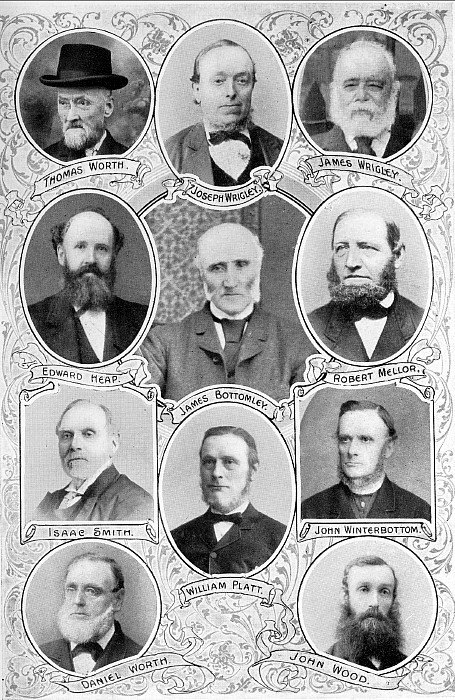
LIVING PIONEERS
|
Mr. Bottomley served in the shop in Piccadilly along with Mr. Joseph Hall,
stepping aside for the first salesman appointed to devote his whole
time to the work. When this experiment failed, he again took
up the work along with Mr. Hall and Mr. Heywood Holden, and carried
the Store on at nights till the appointment of Mr. James Schofield
as salesman, in October, 1858. Often in those early days he
must have worked till nearly midnight, and would be at his regular
employment before 6 the following morning. He served on the
Committee in 1857, and again from 1870 to 1872, but whether in
office or out, he has always been willing to help the Society so far
as lay in his power.
HEAP, EDWARD. Mr. Heap
was one of the first Committee-men, and was deputed to keep Mr.
James Wrigley company at night in Piccadilly. His connection
with the Society was cut short by removal, but he is still alive,
and recalls with zest the pleasant, though arduous, hours spent in
the Society's service.
MELLOR, ROBERT.Mr.
Mellor was one of those who participated in the sales in the old
Press Shop, and was on the first Committee. He was often in
evidence at night in Piccadilly, and was entrusted with the
conveyance of the cash to Mr. Byrom, Treasurer.
PLATT, WM. (Bradbury's).
Mr. Platt, like the rest of this group, joined at the starting of
our Society. He served on the Committee, 1879-80, and was a
useful worker.
SMITH, ISAAC. Mr.
Smith came from Halifax to Greenfield Mills as foreman dyer in
February, 1853. He assisted Mr. Joseph Wood in preparing the
rules, was Chairman of the Committee in 1863, and was first delegate
to represent our Society at the formation meetings held in
Manchester in 1863, prior to the commencement of the C.W.S. He
assisted at the revision of rules in May, 1864, and was a zealous
worker in many ways. Since leaving Greenfield he has taken an
active part in the civic life of both Dewsbury and Batley, and is
now living in honourable retirement at the former town.
WORTH, THOMAS. This
gentleman is not only a pioneer, but a present day worker as well.
He often helped at night in the shop in Piccadilly, and on one
occasion when he balanced his book the cash he had was 2d. over, and
his colleagues insisted on his keeping it as his wages all the pay
he got then for what he did! His early connection with our
Society ceased through removal. He returned in 1891, and was
put on the Committee, January 11th, 1892, and on the first
Educational Committee in August the same year. He was made
Treasurer to that body in March, 1899, a position he still holds;
and was re-elected on the General Committee in January last by a
record vote.
WRIGLEY, JOSEPH. This
gentleman was one of our pioneers, and worked hard at the start to
get the Society going. On one occasion, at the close of the
night's work in Piccadilly, he was without can to carry home the
usual supply of treacle; nothing daunted, he had it weighed out, and
took it home wrapped in strong paper, and thus overcame the
difficulty. We could wish for more of this kind of loyalty
to-day.
WRIGLEY, JAMES, was a
member of the first Committee appointed under the rules, and took an
active part in its early work. He was one of those appointed
to sleep on the shop premises at Road End, and he served on the
Committee in 1859-60, and probably 1861. He is still a member,
and watches with great interest the work of the Society.
WORTH, DANIEL. This
gentleman began at the beginning and was one of the first
Committee-men. He does not appear to have kept his official
post for any length of time, but has retained his membership and is
still living to rejoice in the Society's progress.
WOOD, JOHN (Andrew
Mill). It was the lot of this gentleman to labour at Greenfield
Mills as a fuller, when work began at midnight on Sundays and lasted
till the Saturday evening, for 17s. 6d. per week. Removal to
another district cut short his connection with us, but he takes a
pleasure to-day in recalling the Press Shop sales, and the meetings
held for the formation of our Society.
WINTERBOTTOM, JOHN
(White Lee). Mr. Winterbottom has had an unbroken connection with
our Society from its inception. He served on the Committee
1859-60, and he frequently undertook various commissions for the
Society from time to time as required by the Committee, thus serving
the Society when service was needed to the best of his ability.
PIONEERS AND NOTABLES.
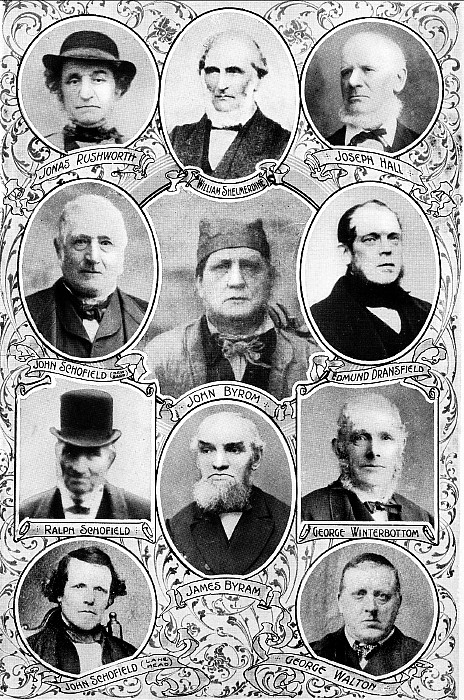
PIONEERS AND NOTABLE WORKERS.
BYROM, JOHN Mr.
Abraham Whitworth was chosen as Treasurer at the formation meeting
of the Society, but he withdrew from the office before the month was
out, and Mr. John Byrom, of Waterside, was appointed to fill his
place. Mr. Byrom was a typical British workman, and with the
assistance of his good wife he worthily discharged the duties of his
office till July, 1860, when he was succeeded by Mr. Wm. Shelmerdine.
BRADBURY, CHARLES. Mr.
Charles Bradbury became a member of the Committee late in 1857, and
was an enthusiastic worker. He was made a Trustee, and his
name appears on the first deed conveying land for our Stores.
In season and out he took a delight in advocating Co-operation, and
did his part in advancing the best interests of our Society.
BUCKLEY, WM. This
gentleman began to take a leading part in 1863, serving on the
Committee then and in 1869-71. He was Chairman in 1863, and in
1870 filled that position for a second time. A steady and
careful worker.
BYRAM, JAMES. The
third gentleman to take the office of Treasurer was Mr. James Byram,
and he also was Chairman in 1864, and again in 1877. No less
than three times he was elected to the Committee, coming on in 1864,
in 1867, and again in 1875. He was made Treasurer in January,
1870, and held this office till it was merged in the managership on
July 14th, 1873, and passed into the hands of Mr. Dan Holden.
He was an occasional speaker at the Society's parties, and an
earnest advocate of Co-operation.
BOOTH, NATHANIEL AKED.
Owing to one of the minute books being lost, the date of Mr.
Booth's appointment to the Committee is uncertain. That he was
in office at the beginning of 1867 is certain, and that he was
appointed again in 1869 is also evident. In 1876, he received
his third appointment, but it is as Secretary that he is best
remembered. He succeeded Mr. Jonathan Winterbottom, whose
death left the office vacant. He was appointed on May 5th,
1879, and held the office with great acceptance till his retirement
on January 20th, 1887, after nearly eight years' faithful service.
BOOTH, Councillor GEORGE.
This gentleman is suitably referred to in the story of the Society
and the Educational Department, q.v.
BOTTOMLEY, CHARLES.
Mr. Charles Bottomley joined the Committee in 1869, and filled the
chair in 1870, a period of change and difficulty, when a steady hand
at the helm was needed. Mr. Bottomley is still a member, but
advancing age prevents him from further participation in the
Society's work.
BOTTOMLEY, JAMES, Junr.
This gentleman was appointed to the Committee in January, 1893,
and served till the end of 1902, and so has put in ten years of
useful work.
BRADBURY, THOMAS, was
made President of the Society on July 20th, 1868, and from the
minutes he appears to have been the first to be elected to fill the
office continuously. He was engaged as a joiner under the
contractor who erected our grocery stores in 1861, and narrowly
escaped being killed when the roof beams were being laid, through
the crane giving way, but fortunately he perceived his danger in
time. During his long connection with the Society, he has
always been willing to place the benefit of his knowledge and
experience at the service of the members.
BRAY, ANTHONY. Along
with Mr. J. T. Bradbury, Mr. Bray took an active part in the
introduction of the book system. He sat on the Board
continuously from 1883 to 1893.
BUTTERWORTH, GEORGE.
The year 1868 brought Mr. Butterworth on the scene, when he served
till 1869. He was again elected in 1872, and served till 1875,
and occupied the chair for a good portion of that period.
BUCKLEY, JOHN. Mr.
Buckley was first elected to the Committee in 1883 and served till
1888. He was again appointed in 1889 and remained in office
till 1893. He is now a familiar figure as hall keeper.
BRADBURY, JOHN THOS.
Our President was elected on the Committee on July 14th, 1884.
He took an active part in the introduction of the book check system
in 1885, and succeeded Mr. William Lees as President on February
14th, 1887. In July this year, if spared, he will complete 22
years' service. During this long period his wide and intimate
knowledge of building and kindred matters has been of great use to
the Society. In these things he takes a deep interest and
brings to their consideration a ripe experience, acquired by many
years' service as sanitary officer to the local authority and
foreman of his father's works.
DRANSFIELD, EDMUND.
Mr. Dransfield was an early worker, for he came on the Board in 1859
and served till 1863. He often assisted in the Stores at busy
times and at night.
GODLEY, JOHN. Mr.
Godley found his way on to the Committee at the same time as Mr.
Dransfield, and he, too, made himself useful in the shop when extra
help was needed.
HALL, JOSEPH. Mr.
Joseph Hall shares the honour of being first salesman with Mr. James
Bottomley, and seems to have been of the same mind, ever ready to go
on, or give up, as suited the Society's interest. He was also
one of the first Committee-men and served the Society faithfully in
its days of difficulty.
HIRST, JONATHAN. Mr.
Hirst, so far as is known, was first Chairman of the Society.
He was an earnest Co-operator and a fearless champion of its
principles. He was appointed on the Committee in 1857, and
kept on till 1864. He was again appointed in 1867 and served
till 1870, and so put in two fair spells of hard work for the
Society, and took a keen interest in its doings till his death.
HILL, JOHN, and HIRST,
GEORGE, both died in harness in 1905, and are
suitably noticed in the narrative elsewhere.
HAWKYARD, RALPH. Mr.
Hawyard was the last to hold the office of constable before the
establishment of a regular police force. He served on the
Committee 1868-1870, and was Chairman in the latter year.
During his term a good deal of uneasiness and turmoil made the
office of Chairman anything but a sinecure. The staff at that
time did not work together very smoothly.
HOBSON, JOSIAH. Mr.
Joseph Wood left the secretariat in the beginning of 1866, when Mr.
Hobson took his place, and held the office till January, 1870.
During his term more attention was paid to questions of depreciation
and classification of expenses than previously. He was a
clever penman, had some knowledge of accounts, and was well able to
hold his own when under quarterly-meeting criticism.
HOLDEN, HEYWOOD. Mr.
H. Holden assisted Messrs. Bottomley and Hall with their evening
sales, and was a quiet, willing worker, when work was heavy, pay
light, and honour nil.
HOLDEN, DAN, Manager.
Mr. Holden began his Co-operative career as a grocery assistant at
Greenacres Stores. From there he went to Hyde Society where he
remained for three years. His next move was to take over the
management of Bradshaw Society, near Bolton, in 1871, and it was
from this place he came to Greenfield Society the last week in
April, 1872. From that time to the present "This one thing I
do" seems to have been his motto, and his sole aim in life to make
the Co-operative Society in his native village into one of the most
successful of village Societies. Let the reader look at the
tables at the end of this book, and note the Society's position in
1872, and compare the totals with those for 1905, when he will see
at a glance how well he has succeeded. Thirty-four years'
service does not seem to have damped his zeal. He is as
anxious as ever to promote the welfare of the Society in whose
service he has spent the best years of his life.
HAILSWORTH, WM. SEVILLE.
This gentleman is our youngest official recruit. He was
appointed Jubilee Secretary by the Committee, and as such has an
opportunity of serving the Society, of which he will no doubt avail
himself to the full.
LEES, JOHN BRADBURY.
Men of the type of Mr. J. B. Lees are not too common in any
district. A strong, self-reliant man himself, he worked to
secure a chance for the development of similar characteristics in
others. He joined the Board in 1859, and at the annual meeting
held January 6th, 1862, a new Committee was appointed, of whom Mr.
Lees was one. Also, he occupied the chair in 1862.
LEES, WILLIAM. Mr.
William Lees was the son of Mr. J. B. Lees, and joined the Board in
1874, and served with only one short break until he retired in 1887.
During this long period he proved himself a painstaking and capable
worker, and worthily filled the chair for a considerable part of
that time.
LAWTON, EDWIN. No
movement could succeed without its quiet workers. Mr. Lawton
was one of these. He filled the chair in 1864, and took an
active and intelligent interest in the revision of rules made in
that year, and was often "told off" to take stock and to do other
work of a like nature.
LAWTON, DAVID. Mr.
David Lawton, son of the fore-going, received his baptism of
Co-operative fire as a pioneer member and Secretary of the Newtown
Co-operative Society Limited, which was formed in 1876 by a band of
Yorkshiremen, who introduced Co-operation into the town where its
founder was born and is buried. On Mr. Lawton's return to his
native place he joined Greenfield Society on July 1st, 1878.
In the May following he was appointed by general meeting one of the
Hall and Shops Building Committee, and in July was made a member of
the General Committee, serving two years. On January 20th,
1887, he was appointed permanent Secretary and Cashier, the first to
hold that office; and he still retains it. At the May
Conference of the Oldham District Conference at Grasscroft in 1895
he was appointed a member of the Executive of that body, and has
read no less than ten papers at its Conferences. He is also an
occasional contributor to the Co-operative News and the local
press.
MATTHEWS, ABSOLEM. In
1867 Mr. Matthews came to the fore, and was Chairman at many of its
meetings. He was Secretary of the Hall and Shops Building
Committee in 1879, and has always taken a keen interest in the work
of the Society.
MALLALIEU, DAVID. This
gentleman served on the Committee in 1876-7; also on the Cottage
Building and Hall Building Committees in 1876 and 1879 periods of
anxious work.
MOORE, WALTER. Mr.
Walter Moore joined the Board in 1903, is still in harness, and
doing useful service.
PLATT, THOS. Mr. Thos.
Platt was appointed to share Mr. Wood's work as Secretary, on April
6th, 1857, and for a time it is not easy to trace their respective
work. Doubtless they each took their own line and divided the
task to suit themselves. Being a man of some social standing
and education, his connection with the Society would be of great use
in many ways to the members.
PRIESTLEY, SOLOMON. In
the beginning of 1893 Mr. Priestley was appointed a member of the
Committee and still holds his position. He represented our
Society at the Huddersfield Congress and at the meetings of the
International Alliance in Manchester.
RUSHWORTH, JONAS. The
first sign erected over the old shop bore the name of Mr. Rushworth.
He was one of the first Trustees, and he, along with Mr. Ralph
Schofield and Mr. Thomas Platt, duly discharged their office by
re-conveying the land in their names to the Society by a deed
executed April 15th, 1876.
ROBINSON, WILLIAM, and ROBINSON,
SAMUEL. The first-named of these two
brothers served on the Committee in 1862-4, and the second in
1867-8, and again from 1872 to 1880. Both of them were earnest
and active Co-operators.
SCHOFIELD, RALPH. "It
is required of stewards that they be found faithful." Mr.
Ralph Schofield, chosen as Trustee at the first general meeting, was
certainly faithful in the discharge of his duties. He sat on
the Committee in 1864, and, along with Messrs. Rushworth and Platt,
brought his trusteeship to an honourable close by joining in the
execution of a deed of conveyance to the Society, April 15th, 1876.
SCHOFIELD, ISAAC. This
Mr. Schofield sat on the Committee in 1858, and took an active
interest in the erection and completion of our first premises in
1861-2.
SCHOFIELD, JAMES (Fern
Lee). This gentleman, brother-in-law of the living pioneers,
Messrs. Joseph and James Wrigley, was a most estimable and
enthusiastic pioneer, and often paid visits to our Piccadilly shop
at the commencement of our Society's career.
SHELMERDINE, WILLIAM.
Mr. Shelmerdine was the second to hold the office of Treasurer, and
he discharged its duties for 9% years; his successor, Mr. James
Byram, taking it from his hands in January, 1870.
SCHOFIELD, JOHN (New
Barn). Among the early Auditors Mr. John Schofield held a place,
as he was known to be fairly well up in figures, and of upright
character.
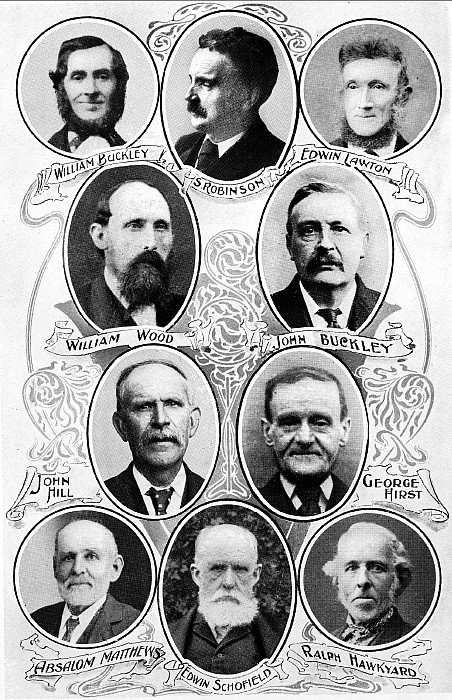
NOTABLE WORKERS.
SWALLOW, JAMES. Mr.
Swallow was an enthusiast in Co-operative work, and was chosen as
one of the first Trustees, but removal from the district cut short
his career as a worker here.
SCHOFIELD, JOHN (Lanehead).
Mr. Schofield was one of the Trustees to whom the land for our
grocery premises was conveyed April 5th, 1860. He was a
diligent worker, and did a good deal of purchasing and other
business for the Society before marketing was handed over to a
permanent manager. He served on the Committee in 1859-60, and
again in 1862; but whether in or out of office he was a most active
and useful member. He died March 1st, 1863.
SCHOFIELD, JAMES
(Salesman, 1858-70). This gentleman was the son of the foregoing,
and during his connection with the Society he was ably seconded by
his wife, Mrs. Jane Schofield, who is still living, and retains a
vivid recollection of the days and nights of toil and struggle
shared with her husband during nearly 12 years' service. In
this period the sales rose from about £1,000 to over £12,000 per
annum. Mr. and Mrs. Schofield left the Society in June, 1870,
to begin business elsewhere on their own account.
SCHOFIELD, EDWIN (Tang).
It is not those who make the biggest show who do the world's work.
The mightiest forces of nature are silent, but all potent, and the
silent plodding workers are the sure upbuilders of any movement.
Mr. E. Schofield assisted his brother James in the shop at that
period of the Society's history when 3d. per hour, and nothing per
hour with plenty of ill-natured criticism, was all the pay that was
accorded; but, like many others, he was ever willing to put his hand
to anything he thought likely to further the Society's interests.
SHAW, JOSEPH. Among
those who have a long record of service Mr. Joseph Shaw holds a high
place. He joined the Committee in 1880, and went on till 1892.
He has also put in a long spell of work on the Educational
Committee, and is still an active member of that body to-day.
SHAW, JAS. EDWARD.
For a period of three months in 1868 this Mr. Shaw served as a
temporary assistant in the grocery department. He became a
member of the Board in 1885, and has served ever since, with the
exception of a short break in 1893. He has served on the
Educational Committee from its commencement, and is still a member
of both General and Educational Boards, and an active present day
worker.
TAYLOR, CHAS. When our
penny bank opened, Mr. Taylor, then a boy, was amongst the first who
entered. He became a member of the Board in 1903, and he
filled the office of Secretary to the Educational Committee for a
time. He is still a member of that body as well as of the
General Committee.
WOOD, JOSEPH. Perhaps
no man did more to get and keep our Society going during the first
chequered years of its existence than Mr. Wood. Much clerical
work would have to be done by him of which the members would see
little, and know less. Certain it is that the salary voted to
him was no adequate payment for his work. But he was a good
man, of clear perception and sound judgment, and he saw in
Co-operation a way whereby he could help his less-fortunate
neighbours, and gave without stint his best thought and unceasing
labour to found our Society, and lived to see much good as the
result of his work.
WINTERBOTTOM, JONATHAN.
In the early days of the Society a change of Auditors was a common
thing, such a thing as holding an office of this sort for 25 years
was unthinkable. The first to be chosen for this office was
Mr. Jonathan Winterbottom, and after him quite an array of names.
In February, 1870, he was made Secretary, and he held the office
over nine years. It was something of an inspiration to hear
him read out the motto, "United you stand, divided you fall," which
at that time occupied a prominent place on the balance sheet over
the Committee's report, whenever he rose in the quarterly meetings
to read that document to the members.
WINTERBOTTOM, GEORGE.
This gentleman's labours have been recorded in the early history of
the Society, Chapter 11.
WALTON, GEORGE. Little
is recorded of this gentleman beyond the fact of his being one of
the first Committee-men, though he kept up his membership till 1863.
WOOD, WILLIAM. Mr.
Wood was elected to the Committee in April, 1872, and assisted at
the revision of rules in 1873. He also presided over some of
the Society's meetings and took an active part in its work during
his period of office.
WALTON, CHARLES ROBERT.
Mr. C. R. Walton was appointed to the Board in July, 1897, and
served till 1902. He was made Secretary to the Educational
Department in July, 1897, and still holds that office.
WHITEHEAD, RALPH.
Perhaps few people know of all that this gentleman did to get our
Society going. He was a man of some means, and he often lent
sums of money to assist those of his neighbours who were anxious to
get free from their thraldom of debt and join the Society, giving
them plenty of time to repay him as they could from their dividends.
He was also a Trustee and served on the Committee in 1857-8.
WALKER, JAMES. Mr.
Walker came to the fore in 1862, and was Chairman part of that year.
It was during this year that the business was removed into the
present grocery premises, and the minutes of this period are full of
details as to the arrangement of the new Stores.
WINTERBOTTOM, WILLIAM HOWARD.
The vacancies caused by death in 1905 left openings for new men.
Mr. W. H. Winterbottom was appointed in July, and is addressing
himself to the problems of the Society as they arise from time to
time. The office of a Committee-man is not the comfortable
sinecure some people think. Time and experience are both
needed to fully equip a man for such a position.
Many others deserve recognition but space forbids. But
mention must be made of such workers as Messrs. Isaac Bottomley,
Thos. Crowther, Jas. Fielding, I. Haytack, Thos. Lord, Geo. Mellor,
John Rhodes, and Robert Whitehead, all of whom have served on the
Committee for longer or shorter terms and done useful work.
Amongst our Auditors Councillor Charles Priest holds the
record with 25 years unbroken service; Messrs. B. B. Bradshaw, Thos.
Evans, W. F. Holroyd, and H. Hudson have also gone into double
figures, and deserve honourable mention for long and capable
service. Mr. Joseph Hamer Taylor has served eight years, and
he, too, has carefully and intelligently watched over the members'
interests during his term of office.
――――♦――――
CHAPTER
IX.
Cottage Building.
|
Home is the nursery of a nation's might,
The source from whence her purity must flow;
The place from which must shine her future light,
The soil in which her future fame must grow. |
IN
pre-co-operative days the credit system was not the only evil thing
from which Greenfield people suffered. Their dwellings, in the
majority of cases, were unsuitable, and in far too many instances
they were positively bad.
The following may be taken as a fair description of the home
of a temperate and thrifty artizan so late as 1860. The house
consisted of one sleeping-room upstairs, one room on the ground
floor, in which all the domestic operations had to be carried on as
best they could. In one corner of this room, under the stairs,
the coals were kept; in another, there was a slopstone, over which a
few shelves held the crockery. A recess at the bottom of the
stairs formed a pantry, where the food was kept, and where the wash
tubs and other utensils were stored when not in use. The
furniture consisted of a chest of drawers, a table, and a few
chairs. Carpets, curtains, and pictures were luxuries possible
only to the few. Sometimes a piece of wool sacking would be
made to serve as a floor covering, and some clever housewives
contrived to make rugs out of cast-off clothing, which often proved
warm and serviceable. The flagged floor scrubbed clean was
whitened with rubbing-stone, or chalk. The walls, white-washed
with lime, were often destitute of pictures. In dwellings such
as these, large families of sons and daughters were born and reared.
But what chance was there under such conditions of family comfort
and decency?
Compare this picture of things as they were with the cottages
which the Society has supplied to its members, with their two,
three, and four comfortable bedrooms, according to size of the
house; kitchen, pantry, living-room, and front room, all tastefully
painted and papered, and arranged for the comfort, health, and
convenience of the inmates. Nor is this all by a long way.
Each house has its own spacious yard, with wash house, coal place,
and closet enclosed. If we could look inside we should find
all the rooms well furnished, and the floors carpeted; the windows
adorned with curtains; tasteful pictures on the walls, and in many
cases pianos, organs, or harmoniums, on which the sons and daughters
discourse excellent music, thus adding greatly to the brightness of
the home life. Most of these improved conditions have been
brought about by the work of our Society, and in helping on these
beneficent changes the Society has more than justified its
existence.
|
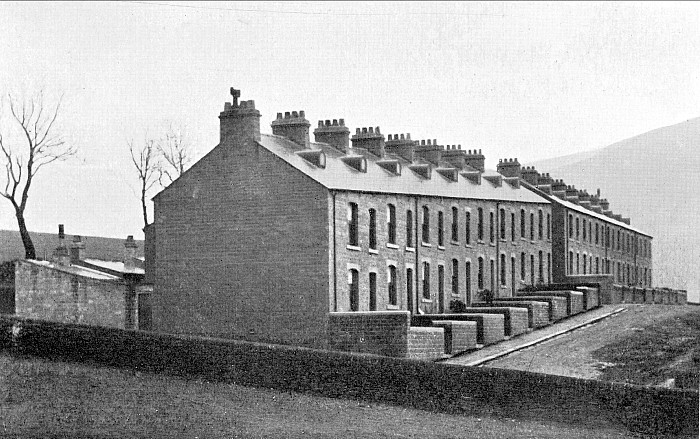
BERRY STREET COTTAGES
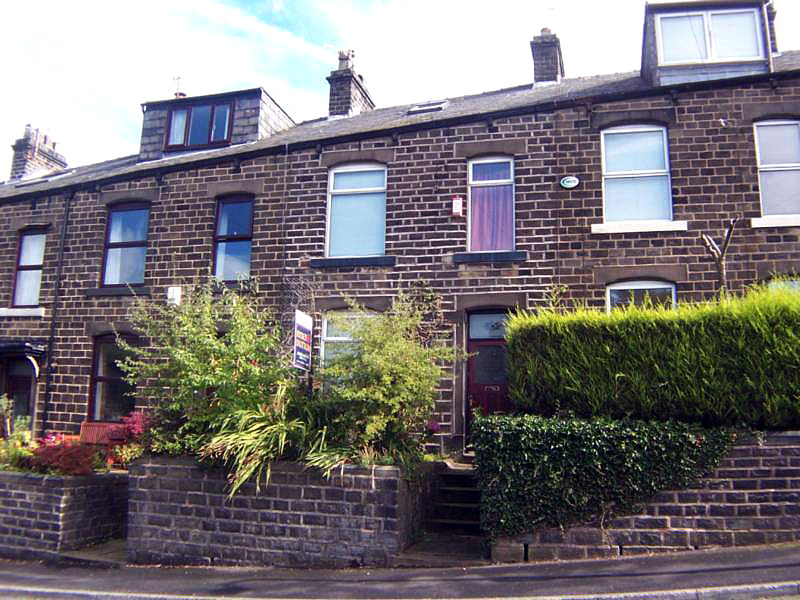
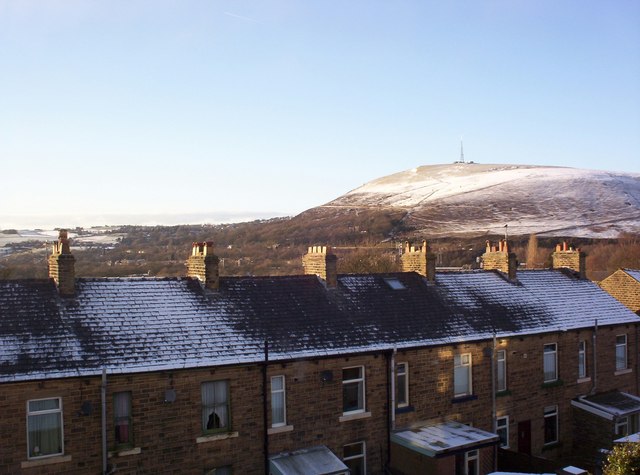
|
Early in 1875 the idea of taking up cottage building came
before the members, and in April the matter had so far advanced that
the Committee were empowered to purchase a plot of land at Spring
Grove for building purposes. On June 28th, it was decided to
acquire a second plot, on the same conditions if possible, and on
December 7th, a conveyance was executed of two plots of land at
Spring Grove, containing 4,302 square yards, at 2d. per yard, from
Mrs. Brideoake to the Society for ever. On December 13th, a
special meeting of members was held in Boarshurst School, which
adopted a code of building rules containing the usual equitable
provisions, and these were signed by the following persons:
|
THOMAS BRADBURY,
President.
JOHN THOMAS
SCHOFIELD,
WILLIAM LEES,
JAMES BYRAM,
SAMUEL ROBINSON,
FRANKLIN FISHER,
NATHANIEL AKED
BOOTH.
DAVID MALLALIEU.
JONATHAN WINTERBOTTOM,
Secretary. |
These rules were duly registered 23rd February, 1876, and the
Society was now in a position to carry out its purpose.
On January 10th, 1876, the general meeting appointed the
following gentlemen as a Building Committee: William Sharpe
Gartside, James Byram, Ralph Schofield, John Schofield, Edwin
Bottomley, N. A. Booth, David Mallalieu. This Committee met on
February 2nd, and appointed Mr. James Byram as its President, and
Mr. Nathaniel Aked Booth, Secretary, and on the 4th of February it
decided to erect thirteen cottages on the plot directly opposite the
grocery stores, and engaged Mr. James Lawton, architect, of
Uppermill, to draw plans. On March 24th, tenders were let to
the following contractors:
|
£ s. d.
Masonry, Mr. Joel Byram .................
1300 0 0
Joinery, Messrs. Hewkin Bros. .. . ....
576 0 0
Plastering, Mr. J. Cudworth ...... . ......
150 0 0
Plumbing, &c., Mr. J. Hudson .........
61 10 0
Total ...................... £208710 0 |
This site gave the Committee a good deal of anxiety, and
unfortunately the type of house chosen and the manner of erection
rendered the whole of this block unsuitable for the separate
conveyance of houses to members. The high cost of material and
labour at the time also proved a drawback, and this first venture of
the Society in cottage building was most discouraging in its
results. But in spite of many difficulties and much hostile
criticism the Committee carried their scheme through, and added
thirteen good comfortable cottages to the district.
"Once bitten, twice shy," is an old adage that was
exemplified in the Society's cottage building, for it was not until
1886 that any attempt was made to utilise the second plot at Spring
Grove. A special meeting, held February 24th, 1886, decided to
build cottages on the vacant land, and appointed the following
gentlemen as Building Committee: Messrs. James Kershaw, John Shaw,
Fred Armitage, Isaac Whitehead, Joseph Shaw, and John Buckley.
It is somewhat significant that two of the above-named Committee-men
were joiners and two were masons, so that four out of the six had a
practical knowledge of the work in hand. In the interim a
better idea of what kind of houses should be erected had been
arrived at in the district, so that this second venture had a better
start.
|
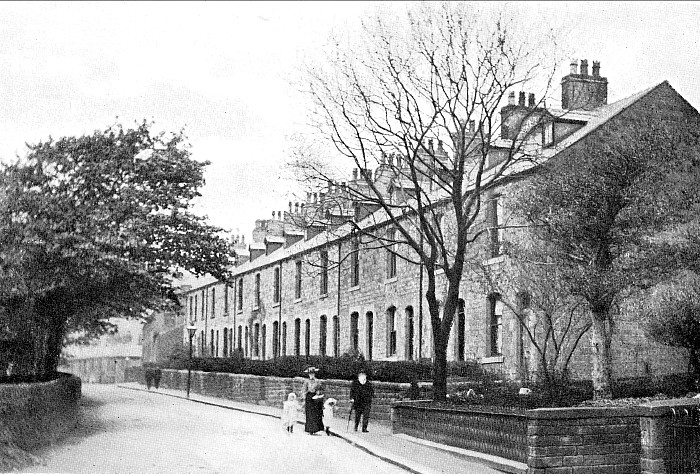
SPRING GROVE TERRACE
|
They met for the first time on March 5th, and appointed Mr.
Joseph Shaw, of Arthurs, Chairman; and Mr. John Buckley, of Spring
Grove, Secretary. Like sensible men, the first thing they did
was to see that proper drainage was provided for the site. Mr.
James Hinchliffe, of Uppermill, was instructed to prepare plans.
Mr. Hinchliffe submitted plans for four houses, and the arrangement
of the rooms and the style of the building at once commended itself
to the Committee. On April 26th and 27th, the principal
tenders were let as follows: Masonry, Mr. James Bourne, £391. 9s.;
joinery, Mr. Thomas Bradbury, £140; plastering, Mr. Thomas
Whitehead, £28; plumbing, Mr. John Whitehead, £31. 10s.; total,
£590. 19s. This venture turned out much more satisfactory than
the first. By the end of December the houses were finished and
tenanted.
On May 12th, 1888, Mr. Wm. Greenhough bought the one he
occupied in this first block; Mr. Ralph Schofield the second in
April, 1890; the third was taken over under building rules in
August, 1891, by Mr. T. Hopkinson, and in September Mr. Thos. Worth
bought the fourth and last of the first block.
Thus encouraged the Society decided in January, 1892, to fill
up the remainder of the plot, and Mr. John Thomas Bradbury was
appointed architect, and he adopted the model of the first four with
improvements. Almost immediately applicants were forthcoming
for every cottage, so that the whole of the houses were arranged for
by their prospective owners before the foundations were put in.
This enabled each owner to have his house fitted to his own ideas as
the construction proceeded.
On February 8th the tenders were let to Mr. Ernest Whitehead
for masonry work, Mr. Thos. Bradbury joinery, Mr. S. Hill plumbing,
and Mr. Thos. Whitehead plastering, and by the end of the year most
of, if not all, the families interested had taken possession of
their new dwellings.
This block of cottages aroused a good deal of interest.
Their pleasing appearance outside is well shown in the accompanying
engraving, Spring Grove Terrace, and the interior arrangements are a
constant source of comfort to the possessors. Under these
circumstances it is not surprising that a demand should arise for
more cottages to be erected under the building rules.
In June, 1897, the Committee began to look around for more
land, and ultimately it was decided to approach Mrs. E. A. Berry,
with a view to securing a plot in Boarshurst Lane, now known as
Berry Street. This was done, and a plot containing 1,510
square yards, at l½d., on lease
for 9,999 years, was obtained, on which eight cottages of a still
further improved type could be erected. Again Mr. J. T.
Bradbury was asked to prepare plans, and on April 18th tenders were
let as follows: Masonry work, Mr. James Bourne; joiner's and
slater's work, Mr. Thomas Bradbury; plastering, Mr. Thomas
Whitehead; plumbing, Mr. W. Hudson. Though late at starting,
by the end of September the main buildings were roofed in.
Four were taken up under the building rules before completion, and
by the end of April, 1899, most of the houses were tenanted.
Before the end of March, 1901, the four remaining cottages
were taken up under the building rules, and several applicants were
disappointed because they could not be served. Steps were at
once taken to secure a second plot in Berry Street, containing 1,695
square yards, which was taken on the same terms as the first.
Mrs. Berry undertook to cut out Hill Street at the same time so as
to make the latter plot more accessible. On June 10th the
tenders were let, and Mr. James Bourne secured the masons' work, Mr.
Thos. Bradbury the joinery, Mr. S. Hill the plumbing, Mr. Thos.
Whitehead the plastering, and Mr. James Shaw the slaters' work.
Again the Society went one better in the type of house
selected. The site lent itself to the ideas of the architect,
Mr. J. T. Bradbury, and of the Committee, by its natural
conformation. So it was decided, after carefully considering
several outline plans, to erect eight superior cottages with every
needful convenience. The following article taken from the
local pages of the "Wheatsheaf" for June, 1901, will not be out of
place here, as it gives not only a clear description of the
arrangement of the rooms, but also indicates the spirit in which
this work has been approached :
THE HOUSING PROBLEM.
So far as Greenfield Society is concerned this problem is gradually
being tackled with a caution which may be regarded by some ardent
spirits as being superfluous, but which is nevertheless wise under
the circumstances. Good houses to live in are a necessity of
family life. A small increase of rent may lead to a great
decrease in such disagreeable items as doctors' bills and loss of
work through sickness. The two-roomed cottage, one up and one
down, with the coals in one corner and the domestic washing tubs in
another, ought very soon to be a thing of the past. How much
of present-day rheumatism and consumption are fairly traceable to
the bad housing which the very poor of the last generation had to
put up with in this district it would be instructive to learn if we
could only get the needful data. Certain it is that a healthy,
sturdy race can never be reared under unhealthy conditions, and in
order to ensure having sound minds in sound bodies we must have
suitable dwellings to live in. Acting on instructions from
quarterly meeting the Committee have again turned their attention to
the matter of taking land and building another block of good-sized
houses, suitable for large families or small if desired to live
in. A good deal of careful thought has been spent upon the
internal arrangements, and judging from the outline plans we should
say that they will be an improvement in several respects upon what
the Society has put up before. Roughly speaking, the following
is the general idea of the architect: Front entrance, stairs
facing the door with suitable handrail. Passage opening into
front room and leading into good-sized living room at the back, on
the right hand side of which will be a suitable kitchen or scullery,
with the usual slopstone. Cellar pantry under the stairway
with door leading into the passage. Upstairs, two capital
bedrooms and bathroom, or box-room as desired, and a good roomy
attic chamber, with round dormer light. In front a good-sized
flower plot with steps up from the footpath. In the back a
good-sized yard, flagged from back door to W.C., wash kitchen and
coal house, with opening into Back Berry Street, all enclosed, each
yard being separated by stone fencing. Not an inch of space
seems to be left unutilised, and the good housewife will find that
she will have all the main housekeeping paraphernalia on the same
level as the living room, a matter of the greatest importance to her
comfort and convenience. We hope the day is not far distant
when every working family where there are sons and daughters may be
able to live in such well-ordered homes.
No time was lost in getting the work forward, and by the end
of November the roof was on, and early in July, 1902, two of the
houses were inhabited by their prospective owners, Mrs. F. H. Hirst
and Mr. J. Hirst, and by October 5th the whole were tenanted.
The total cost of this venture was £2,953. 15s. 10d. when finished.
The engraving of these two blocks in Berry Street gives a fair idea
of their outward appearance, and the comfort and convenience of the
interiors is well in keeping therewith.
The following summary of the Society's cottage building
operations up to March 24th, 1906, will show the extent of its
operations:
|
£ s. d.
23 Cottages, held by Society, cost .........
5,825 7 1
23 ,, built and sold to members ......
5,340 11 2
20 ,, on which Society has found mem-
bers money to
buy or build for
themselves ................
2,383 0 0
Total 66 Cottages. Total expended....
£13,548 18 3 |
Not a had record, surely, for a village Society.
――――♦――――
CHAPTER
X.
Educational Department.
|
Hold up the light, illume the night,
And earth shall blossom fair and bright;
For knowledge from all hindrance freed
Will raise and bless our race indeed,
And usher in the happy reign
Of joy and peace unmixed with pain;
Lift up mankind to heaven's pure height
Of liberty, and love, and light. |
A NATION'S
greatest possessions do not consist in square miles of territory,
but in the brains and energies of its rising youth. Let these
be rightly trained and wisely directed to useful and noble ends, and
then we need have no fear of England's decadence. In the
struggle of life it is the fit who survive not the fitness of mere
brute force, but the resourcefulness and capacity which have been
created by careful training. Co-operation would have done
little for its votaries if it had failed to cultivate character and
develop their mental as well as their material wealth. No
prophetic vision is needed to foresee that the growing wealth of our
movement will be a source of danger if it passes into untrained
hands, and so, almost from the first, wise leaders in our councils
have insisted on education as being of vital importance to our
future advancement.
Greenfield Society, it must be confessed, was late in taking
up educational work. It was often in the thoughts of members
who had an eye to future developments, but nothing tangible was
attempted till the revision of rules on April 11th, 1892, when Rule
17 was so drawn as to allow of 1 per cent of net profit being set
aside for educational work. The first £5 was thus set aside in
the June balance sheet of that year, and on August 29th the
following gentlemen were appointed as Educational Committee: Mr.
Dan Holden, Mr. David Lawton, Joseph Shaw, Mr. J. E. Shaw, and Mr.
Thomas Worth. These gentlemen met in the boardroom on August
31st, when Mr. Joseph Shaw was appointed President of the Education
Committee; Mr. Dan Holden, Treasurer; and Mr. David Lawton,
Secretary. At this meeting it was decided to inaugurate the
department by giving a magic lantern entertainment on September
15th, and to invite the Rev. Edwin Powell, M.A., to preside.
|
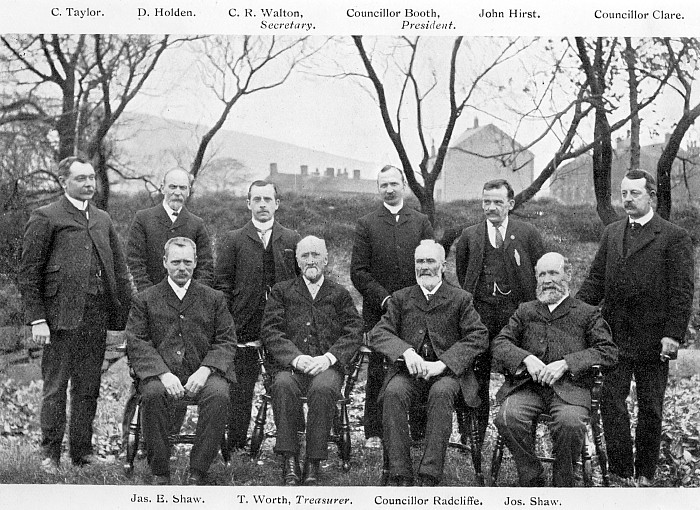
EDUCATION COMMITTEE.
|
On September 7th, the Committee met again, and Mr. W. P.
Holroyd, the head master of St. Mary's National School, was present,
and gave the Committee a good deal of useful information as to
evening classes and Government grants. Steps were at once
taken to get the grants obtainable at the time from the various
educational authorities then in existence. Shortly after the
opening entertainment an evening continuation school was formed, and
Mr. Milton Hirst, the head master of Boarshurst School, took charge
of this work. Classes were formed in steam and applied
mechanics, under Mr. F. Hawkyard; sound, light, and heat, and
electricity, under Mr. James Healey; and physiology, under Mr. W. P.
Holroyd, who had a fairly numerous and successful class. Mr.
David Lawton, assisted by Mr. Herbert Shaw, conducted a very large
shorthand class.
Early in October, in order to comply with the requirements of
the educational authorities, a Committee was formed to supervise the
science classes, of which the Rev. Edwin Powell, MA., was President,
and on which the following gentlemen consented to act: J. P.
Buckley, Esq., J.P., Messrs. C. Radcliffe, James Radcliffe, and
Joseph Shaw, and after the close of the session the grants came to
hand in due course.
The foregoing sketch is intended to show the nature and scope
of the scheme undertaken by the Educational Committee, and indicates
pretty clearly that they accomplished a good deal of really useful
work. Fifty-nine of the evening scholars passed the
examination at the close. The science students also did fairly
well at the May examinations, and the first educational year closed
with a balance in hand.
The second year, Mr. John Hill was appointed Chairman, which
position he held up to his death in 1905, and Messrs. C. Taylor and
George Booth were Secretaries. Science classes and evening
school work were again set on foot, and a cookery class, under Miss
Stanley, attracted 150 lady students. Book-keeping was added
to the list of subjects taught, and a series of interesting lectures
were given on various subjects.
During 1894-5-6 Mr. Geo. Booth acted as Secretary. In
this period, in addition to evening school work, an ambulance class,
under Dr. Aspinwall, was much appreciated, and 26 students obtained
certificates. Sick-nursing classes under Miss Harbottle, and
dressmaking classes under Mrs. Poynton and other lady teachers were
well attended.
In 1897 Mr. C. R. Walton succeeded Mr. George Booth as
Secretary; in 1898 Councillor W. A. Clare joined the Committee as
County Council Representative; in 1899 Mr. Thos. Worth took over the
treasurership from Mr. Holden, and in 1902 Messrs. J. Hirst and J.
Shaw were elected on the Committee. All these gentlemen hold
their respective positions at present.
In January, 1901, the Rev. E. Rowell retired from the
Committee in consequence of ill-health. It would take up too
much space to give even an outline of all that the Educational
Committee has done since the department started, but one or two
other items of special interest must be recorded. In 1897 they
organised a trip to Irlam Soap Works, via. train and ship
canal, when 220 persons visited these celebrated works.
On August 24th, 1898, 236 persons visited Crumpsall Biscuit
Works, and on July 29th, 1899, 250 persons were conveyed to
Middleton Jam Works in 'buses and carriages, and finished up by
taking tea at Balloon Street, Manchester.
Longsight Printing Works was visited on August 29th, 1900,
and this time 220 persons went on this pleasant drive, tea being
served at Belle Vue Gardens.
Bradford Exhibition of Co-operative Productions in 1904 was
the next place visited. On October 1st our Society, in
conjunction with neighbouring Societies in Saddleworth, engaged a
special train, when over 400 persons were conveyed to the
exhibition, 109 of whom went from our Society. The educational
effect of such trips is undoubted. The more Co-operators can
be brought to see the ramifications of the movement, the more likely
are they to understand and appreciate its work.
Lantern lectures on Co-operative subjects have been given on
several occasions by Councillor T. E. Moorhouse, C.W.S. Director.
Lectures on "Nansen and the North Pole," by Mr. Warren, of
Manchester; on travel and pleasure at home and abroad, by Messrs.
Felix Mills, W. Diggle, J. Hutchinson, R. Firth, and others; and
lectures on scientific and general subjects by lecturers from the
Working Men's Clubs' Association Limited. Cinematograph
entertainments, recitals by eminent elocutionists, concerts, and
social parties have been held at intervals, and so the dark winter
months have been brightened and improved for our members and their
families by these agencies.
In September, 1904, the Committee took a new departure, and
started an evening school garden. Arrangements were made by
the General Committee with the owner of the field in the occupation
of the Society, Mr. J. F. Buckley, J.P., who courteously granted a
ten years' lease, with power to sub-let for gardening purposes on
suitable terms.
On Wednesday, September 28th, the 1904-5 session was opened
with a prize distribution and a lecture given on "Gardening and its
Good Effects as a Pursuit or Hobby in forming Character and
improving the Physique of Students," by Mr. Thomas Reddington, of
the West Riding County Council. A class in horticulture was
formed with 25 students, to each of whom a plot was apportioned of
50 square yards. Mr. Joseph Hamer Taylor was appointed
teacher, and the class was well attended through the session.
Commencing on November 15th, Mr. Thos. Reddington gave a series of
live instructive and interesting lectures on "Soils;" "Plants, how
they grow;" "Green Crops;" "Plant Pests and how to deal with them;"
"Window Plants and Flowers;" all of which were well attended and
greatly appreciated. On November 12th Mr. Frank Reddington
paid a visit to the plots and gave a demonstration in practical
work, and the pupils made a good start in breaking up the ground.
On February 18th, 1905, the teacher, Mr. Taylor, planted a
number of fruit trees of various kinds, and at suitable intervals
all the 20 vegetables in the course were duly sown or planted.
In the summer and autumn the garden was a pleasing sight, and Mr. F.
Reddington of the W.R.C.C. declared that it was one of the best
first-year evening class gardens he had seen.
Science classes were discontinued in 1898, students in
science and art subjects being able by means of County Council
Exhibitions to attend classes at Oldham and Mossley Technical
Schools.
Evening continuation classes have been maintained with only
one session's break from the first. During recent sessions Mr.
J. H. Taylor and Mr. Henry Hudson have had charge of this work, and
these classes form a useful link between the day school and the
technical instruction obtainable in neighbouring towns.
In September, 1905, Councillor George Booth was appointed
President in the room of Mr. John Hill, deceased, and now occupies
that position. Taken as a whole this department is doing a
most useful work in the district.
One other matter must be put on record before closing this
chapter, in justice to the Society. Early in 1900 a movement
was on foot for providing a Technical Institute for Saddleworth.
The Rev. Edwin Powell, MA., was chairman; Councillor Priest was
honorary secretary, and seven influential gentlemen formed the
committee who issued circulars asking for public support.
Uppermill Society promised £100, and the circular was laid before
our quarterly meeting held April 9th, 1900, when after careful
consideration it was decided that our Society should promise to
contribute £60 in five yearly instalments of £12, on the condition
that the proposed Technical Institution was under popular control.
This promising scheme fell through for lack of general support at
the time, and Saddleworth students are still dependent on the
Technical Schools of Oldham and Mossley. It is to be hoped
that in the near future some better provision for higher education
will be the outcome of the great educational changes now being made
by Imperial Parliament.
――――♦――――
CHAPTER
XI.
The Penny Bank.
"Gather up the fragments that nothing be lost."
Jesus Christ.
THE teachings of
the Master combine the highest ethics and the sanest business
principles, and thoughtful Co-operators see in their system of
business the ethics of the New Testament translated into the common
business of every-day life. This being so, when men have
learned how to apply Co-operation to every department of human
activity, then, most of the problems which now vex the souls of
humanitarian philosophers, and baffle the efforts of earnest social
reformers, will disappear of themselves.
The practice of thrift must have been ingrained in the very
nature of many of our older generation of members, and so they were
not slow to recognise the value of an institution like the penny
bank as a means of developing this virtue in their children.
On May 6th, 1873, it was decided to start a penny bank.
Suitable rules were drawn up and pass books obtained, and the bank
was started on the 5th of July. By the end of the December
quarter 56 depositors had joined, and the sum of £26. 0s. 4d. stood
to their credit.
In March, 1906, the depositors numbered 460, and the sum
standing to their credit was £3,234. 2s. 3d., or just over £7 each.
This branch of the Society's work has grown quietly and steadily
from the first, and has done much towards bringing in, and keeping
the children in touch with the Society. The lad whose name
appears fourth on the first list of depositors, is now Mr. Chas.
Taylor, an active member of both the General Committee and the
Educational Committee, and many of the girls who joined about the
same time are now wives and mothers, and wielding a good portion of
the "basket power" of the Society.
|
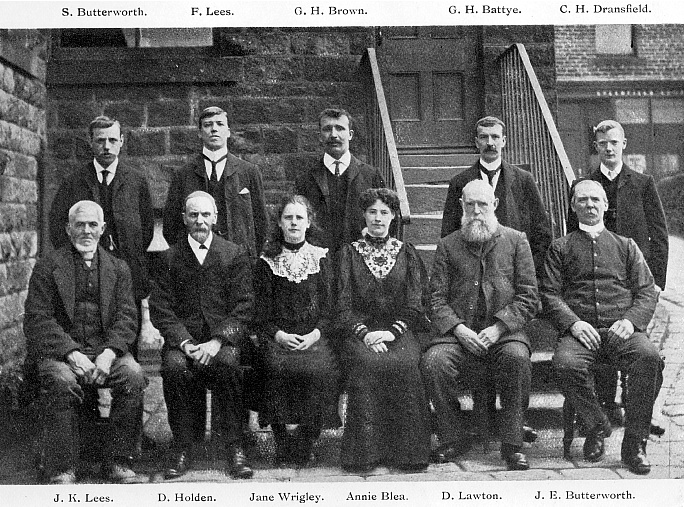
EMPLOYEES.
|
The legal restrictions imposed upon penny banks connected
with Co-operative Societies are a great hindrance to their growth
and usefulness, and cause a good deal of needless trouble to both
depositors and officials. If Co-operators were only half as
wise as they sometimes think themselves, they would insist on the
removal of such trammels. Why should 10s. be the limit of one
deposit? And why in the name of common sense should £20 be the
most that a depositor can invest in this way? Such enactments
are an unwarrantable interference with the liberty of the subject.
They have been imposed in the interest of the great banking
corporations, and ought to be swept out of our way. Surely it
is high time that working men were free to work out their social
salvation in their own way, without being hampered with such
irritating restrictions as these.
――――♦――――
CHAPTER
XII.
At the End of the Years.
|
"Bygone events suggest a tone of manly cheerfulness and
confidence in the future ..... Though there is yet much
to be done more liberty to win, more improvements to
attain despair, and the counsels which spring from it,
are unseemly, unnecessary,, and ungrateful . . . . So
much has been accomplished in half a century what may
not be gained in the next fifty years!"
G. J. Holyoake. |
IN the foregoing
pages an attempt has been made to set forth the origin and growth of
our Society since 1856. But, before closing our story, we
think it will be well to pause as we stand at the end of the years
and take a brief survey of the present position of Co-operation in
Saddleworth district, in order to see what has been achieved during
their flight. The matter may be summed up briefly as follows:
In June, 1856, nothing tangible existed; Co-operation was when a
dream in the minds of a few enthusiasts. In 1906 seven
Societies are in evidence, with a total membership of 3,303, or
nearly 27 per cent of the population in the District Council area.
Their sales for 1905 amounted to £107,555; their profit and interest
to £18,162; their share capital to £61,050; their loan capital to
£15,864; their total assets to £85,942 all this out of a
population of 12,319.
These Societies have also built, and assisted their members
to build or acquire, no less than 150 cottages; many of which are
models of comfort and convenience. Most of the Societies, too,
have educational departments, which are doing useful work.
They also subscribe freely to various charitable and other
institutions.
From these facts it will be seen that the dreams of 1856 have
materialised, and the seed sown then has brought forth a rich
harvest. But much yet remains to be done before the industrial
millennium becomes an accomplished fact. What will the
Co-operative chronicler of 1956 have to record of the workers of
to-day, and their immediate successors? And what will be the
position generally of our movement as a whole at that time?
Well, no one can foresee. But this we know, that if the
present and succeeding generation of Co-operators are true to their
great principles, true to their best traditions, and to themselves.
before that time arrives the workers will be able to emancipate
themselves from the thraldom of capital, and by associated effort
supply themselves with everything necessary for a full and happy
existence.
|
"O, sometimes gleams upon our sight,
Through present wrong, the eternal right;
And step by step since time began
We see the steady gain of man.
Through the harsh noises of our day
A low, sweet prelude finds its way;
Through clouds of doubt and creeds of fear,
A light is breaking, calm and clear.
Look back! how much there has been won;
Look round! how much there is to win.
The watches of the night are done,
The watches of the day begin." |
|
――――♦――――
[Next Page]
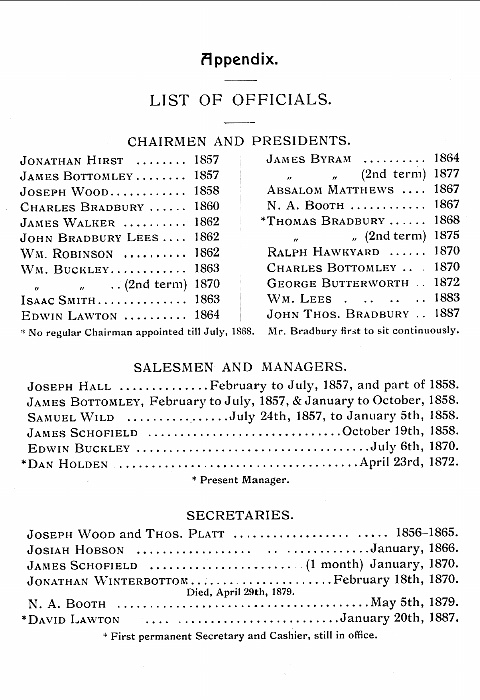
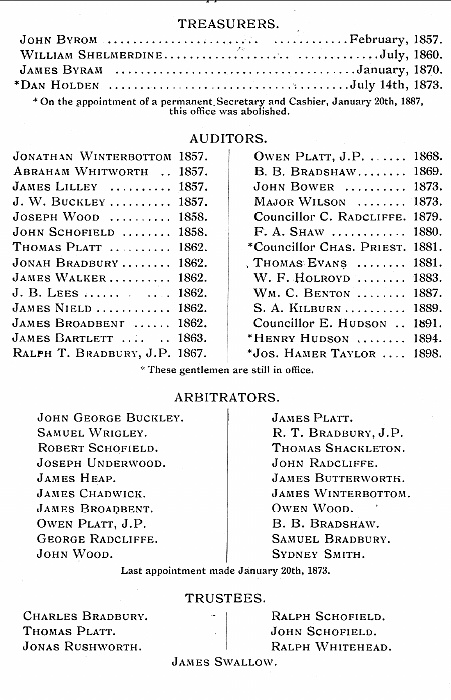
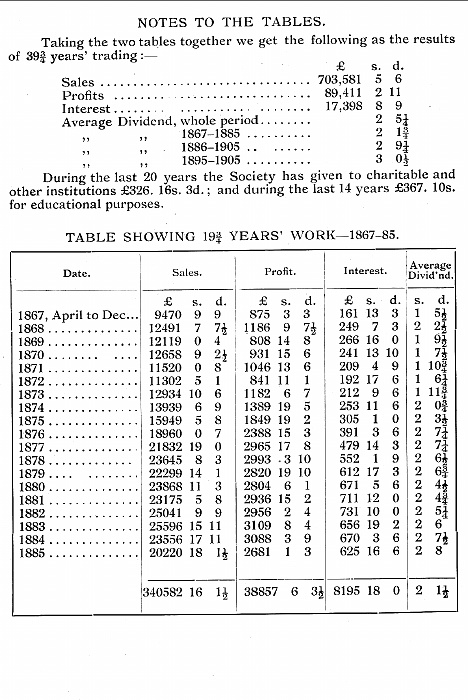
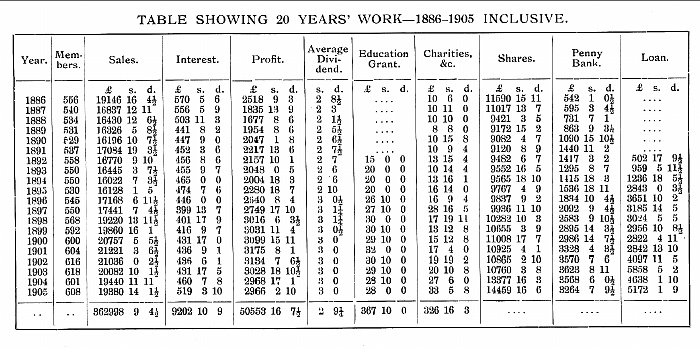
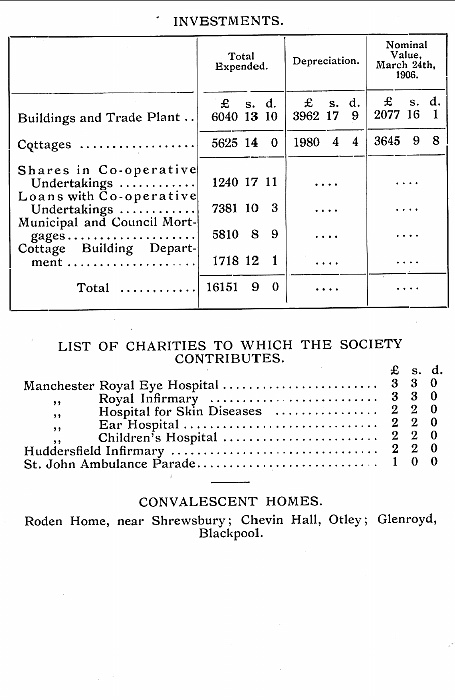
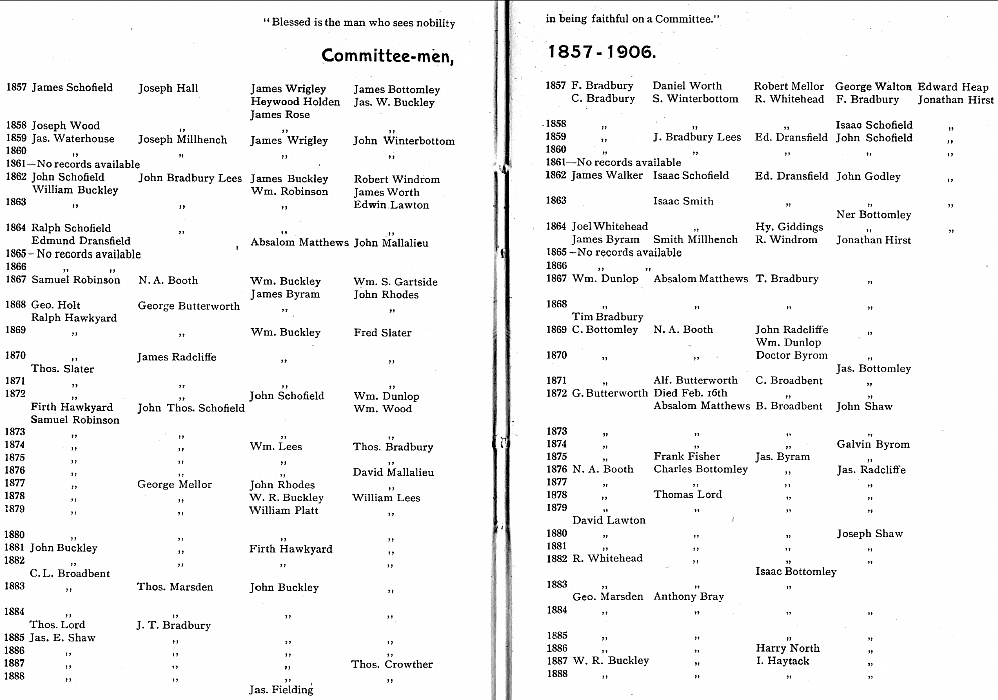
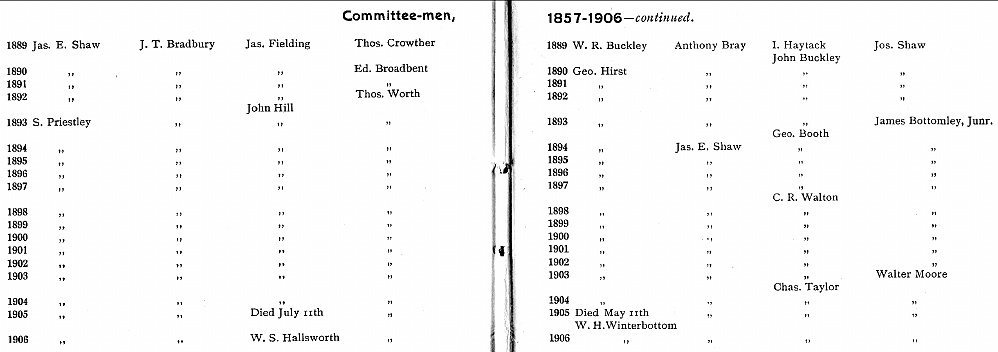
|
Jubilee Ode.
Great God, who rules all human things;
The peasants lot, the thrones of kings;
This joyful day to Thee we raise,
With grateful hearts our song of praise.
Tis all of Thee that with our years,
Our cause has grown, despite our fears,
Till now it spreads from sea to sea,
Knits man to man, mankind to Thee.
Our fathers, guided by Thy hand,
Have made for us this glorious land
An heritage so large and free
Received from them 'twas given by Thee.
Thy hand in all our life we trace,
And grateful bow before Thy face;
With reverence own Thy care, and sing
High praise to Thee, our God and King. |
――――♦――――
MANCHESTER
Co-operative Wholesale Society's Printing Works, Longsight.
1906.
__________________
|
